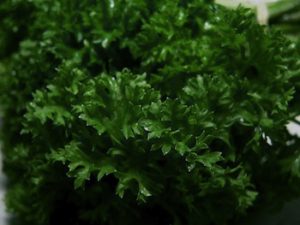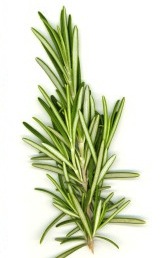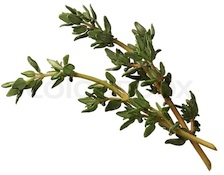Fresh Herbs with Benefits
“An herb is the friend of physicians and the praise of cooks.” – Charlemagne
It’s true, fresh herbs not only add flavor and color to dishes, they may also benefit your health. Fresh herbs contain a ton of vitamins and minerals. Basil, parsley, thyme, lavender and rosemary are particularly beneficial. If you know me at all, you understand my need to throw in the fact that organic is best, especially if you are using them frequently.
Fresh herbs are fairly easy to grow in pots, which makes them quickly accessible and much less expensive than the market.
Buyer beware: If you are getting your herbs from the supermarket or even the farmer’s market, please be aware that not all growers are created equal. Be a detective, ask questions and read labels.
Basil
An article in The New York Times recently credited basil as a top-notch source of vitamin K with healthy amounts of iron, calcium and vitamin A. According to the Times, Vitamin K is needed for blood to clot, while iron prevents anemia and calcium promotes strong bones. Vitamin A helps night vision, among things. Fresh basil also has anti-inflammatory properties and its oils may fend off some harmful bacteria.
Parsley
 Parsley is loaded with powerful antioxidants that help protect cells from the damage caused by free radicals. In fact, fresh parsley has almost twice the carotenoid content of carrots and the same amount found in kale and red peppers, reports the Christian Broadcasting Network. Parsley is also high in Vitamin K and Vitamin C, another antioxidant that also helps wounds heal and aids immunity. It is also a good source of iron and folate, a B vitamin that is particularly important during pregnancy.
Parsley is loaded with powerful antioxidants that help protect cells from the damage caused by free radicals. In fact, fresh parsley has almost twice the carotenoid content of carrots and the same amount found in kale and red peppers, reports the Christian Broadcasting Network. Parsley is also high in Vitamin K and Vitamin C, another antioxidant that also helps wounds heal and aids immunity. It is also a good source of iron and folate, a B vitamin that is particularly important during pregnancy.
Rosemary
 According to the August 23, 2012 issue of Phytotherapy Research, rosemary has been reported to decrease blood sugar levels. Other research that was conducted by scientists at the Sanford-Burnham Medical Research Institute in La Jolla, California suggests the herb may help protect against the oxidative damage associated with macular degeneration. Fresh rosemary may also have cancer-protecting properties and has been shown to help support the immune system.
According to the August 23, 2012 issue of Phytotherapy Research, rosemary has been reported to decrease blood sugar levels. Other research that was conducted by scientists at the Sanford-Burnham Medical Research Institute in La Jolla, California suggests the herb may help protect against the oxidative damage associated with macular degeneration. Fresh rosemary may also have cancer-protecting properties and has been shown to help support the immune system.
Tips
To enjoy the healthful benefits of fresh herbs, University of Nebraska Extension recommends cooking with them. For example, fresh basil is delicious in pesto and rosemary, thyme, and even culinary lavender can be added to chicken, fish, pork and vegetable dishes, as well as soups and grain dishes. Fresh herbs are more flavorful than dried herbs, so use three times as much in recipes and buy them close to the time you plan to use them. If growing your own fresh herbs in a garden, the University of Nebraska says morning is the best time to pick them before the heat of the day sets in. Bump up the taste and your benefit your health by adding fresh herbs to food.
Feel Calmer, Lessen Cramps and Reduce Migraines With Lavender
 Some of the health benefits of culinary lavender as an herb is in combination with marjoram, orange, and rosemary to add exotic fragrance to savory and sweet foods and at the same time feel calmer from the lavender but stimulated from the rosemary.
Some of the health benefits of culinary lavender as an herb is in combination with marjoram, orange, and rosemary to add exotic fragrance to savory and sweet foods and at the same time feel calmer from the lavender but stimulated from the rosemary.
Health benefits such as possible relief from migraine and menstrual cramps or anxiety combine with culinary fragrances in foods when lavender is used. But use only in tiny amounts.
NOTE: A small study published in the New England Journal of Medicine in 2007 concluded that lavender and tea oils in some shampoos, soaps, and lotions may cause gynecomastia (breast development) in males, according to the article, Lavender Herb – Health Benefits and Precautions.
Boost Brainpower With Rosemary
Here’s a great reason to keep a pot of fragrant rosemary in your kitchen: Recently, scientists at the Brain, Performance and Nutrition Research Centre in the U.K. reported that having higher blood levels of one of this herb’s main chemical compounds—absorbed from its aroma—was linked to the speed and accuracy of study participants’ cognitive performance. The higher the level of the compound in the blood, the better the outcome.
Ginger to the Rescue When the Sniffles Show Up

Did you know that ginger is known to sooth a sore throat and can also zap those nasty flu viruses? In addition, ginger is a natural way to relieve pain and reduce fever.
Soothe Your Colon With Peppermint
Irritable bowel syndrome (IBS) affects up to 20 percent of Canadians and many more women than men. Last year, scientists at the University of Adelaide in Australia showed how peppermint helps to relieve IBS by activating an anti-pain channel in the colon. It reduced pain-sensing fibers, particularly those activated by eating chili and mustard.
Fight Inflammation With Oregano
Research in the Proceedings of the National Academy of Sciences showed that when mice with inflamed paws were treated with oregano’s active ingredient—beta-caryophyllin (E-BCP)—the swelling subsided in 70 percent of cases. E-BCP links to structures in a cell’s membrane, inhibiting the production of substances that signal inflammation.
Get Your Antioxidants From Fresh Thyme
 Sprinkle fresh thyme on salmon or chicken that’s headed for the grill: Among fresh herbs, thyme has the second-highest amount of antioxidants (sage has slightly more), according to its oxygen radical absorbance capacity—a measure of a food’s ability to fight off disease-causing free radicals in our body. Thyme is also a very good source of vitamins A and C, as well as iron and dietary fiber.
Sprinkle fresh thyme on salmon or chicken that’s headed for the grill: Among fresh herbs, thyme has the second-highest amount of antioxidants (sage has slightly more), according to its oxygen radical absorbance capacity—a measure of a food’s ability to fight off disease-causing free radicals in our body. Thyme is also a very good source of vitamins A and C, as well as iron and dietary fiber.
I hope after reading this article you will decide to incorporate more fresh herbs into your kitchen and reap the health benefits. Of course, one of the easiest ways to do this is by bringing My Sage Gourmet’s Herbed Seasoning Blends into your kitchen.
I’m here to help.
Book your Kitchen Coaching appointment today!
To your health,

DISCLAIMER– The views expressed here are based solely on personal experience with the products and my interactions with the company’s staff. Your experiences and sentiments may differ from my own.



